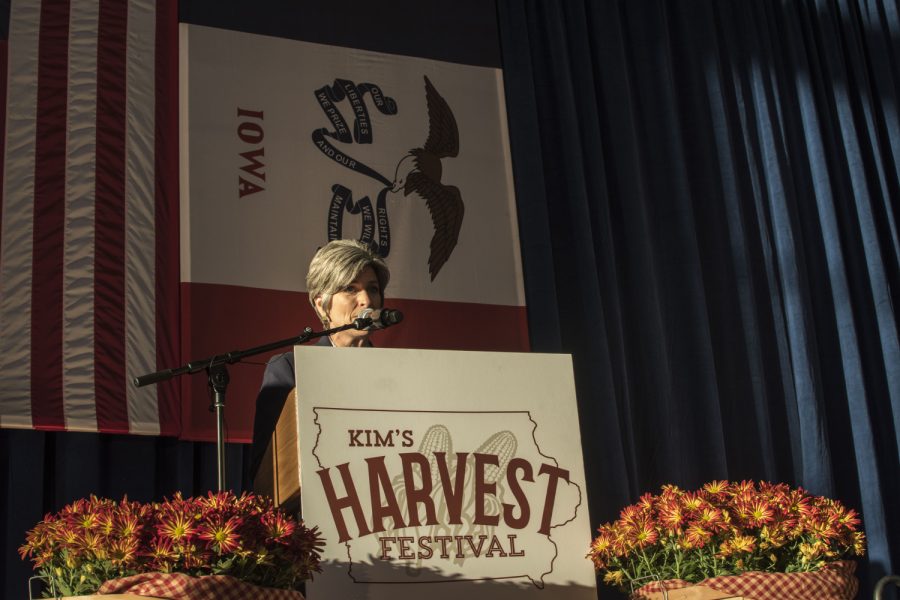Iowa’s U.S. senators express frustration with lack of trade progress
In ongoing trade talks between the U.S., China, Mexico, and Canada, Iowa’s senators say a long-term trade agreement with China would outweigh damage done by tariffs.
Joni Ernst speaks at the Second Annual Harvest Festival on Saturday, October 13, 2018. The event was a fundraiser for current governor Kim Reynolds.
April 7, 2019
As the deadline for a trade agreement between China and the U.S. was pushed back by more than a month, Sen. Joni Ernst, R-Iowa, said in a conference call that a long-term agreement between the U.S. and China will outweigh the damage caused by tariffs.
“While this has been a very hurtful time for everyone, we do think something in place long-range with China will be very beneficial if we can count them as a reliable trade partner,” Ernst told reporters on April 4.
U.S. trade representatives met with a Chinese delegation from April 3 to April 5, during which they negotiated nontariff barriers, intellectual-property theft, agriculture, and enforcement, according to a statement from the White House.
The trade disputes have led to tariffs on some of Iowa’s major exports. China, Mexico, and Canada are all customers of Iowa’s agriculture products, and the state’s agriculture sector has seen the consequences of retaliatory tariffs from the three countries.
Ernst said she thinks a deal between the U.S. and China is imminent, and the countries are working on enforcement provisions for when — or if — a deal is made.
Iowa State University published a report in September 2018 that said the average revenue lost for Iowa’s soybean industry as a result of China’s retaliatory tariffs was $545 million. The average revenue lost for corn was $333 million, and the pork industry lost an average of $776 million. The tariffs on U.S. agriculture products are still in place.
China imposed retaliatory tariffs on U.S. agricultural products and automobiles in July, and trade talks for a settlement have been ongoing since then. Tentatives agreement deadlines have been pushed back in the months since by both countries.
Sen. Chuck Grassley, R-Iowa, said in an April 3 conference call that the U.S. has so far negotiated accomplishments with China on intellectual-property theft, Chinese currency manipulation, and U.S. agriculture exports to China.
“[Tariffs have] been a definite cause for China to be negotiating in good faith,” Grassley told reporters in a conference call.
Dermot Hayes, an Iowa State University economics professor and coauthor of the September report, said the Iowa senators are correct that there could be a potential agreement with China that would override the damage done by tariffs.
“I do believe that Sen. Ernst is right in that regard,” Hayes said. “Just as soon as the agreement is signed, I think China will announce pretty large purchases of corn, soybeans, and pork.”
Mexico and Canada
Trump has been negotiating a new NAFTA deal known at the United States-Mexico-Canada Agreement, and the three countries still have tariffs — and retaliatory tariffs — in place.
Hayes said in an interview with The Daily Iowan in January that the agreement would open up Canada’s dairy and poultry markets but that Iowa would not see any significant benefits that would outweigh Mexico’s 20 percent retaliatory tariff on U.S. pork.
Grassley said that he told President Trump he should take the tariffs off Canada and Mexico because an agreement was made, but that Trump wants to keep the current tariffs on those countries in place.
Grassley, who chairs the U.S. Senate Finance Committee, said Canada won’t pick up an agreement until the U.S. takes the tariffs off.
“[The tariffs] were put on because the president thought Mexico and Canada weren’t going to negotiate. They’ve negotiated,” Grassley said. “The president says he has a good agreement. I agree with him. I’m going to vote for it, so let’s get the tariffs off. I’ve been telling the president that three weeks ago right now.”






